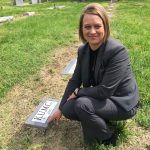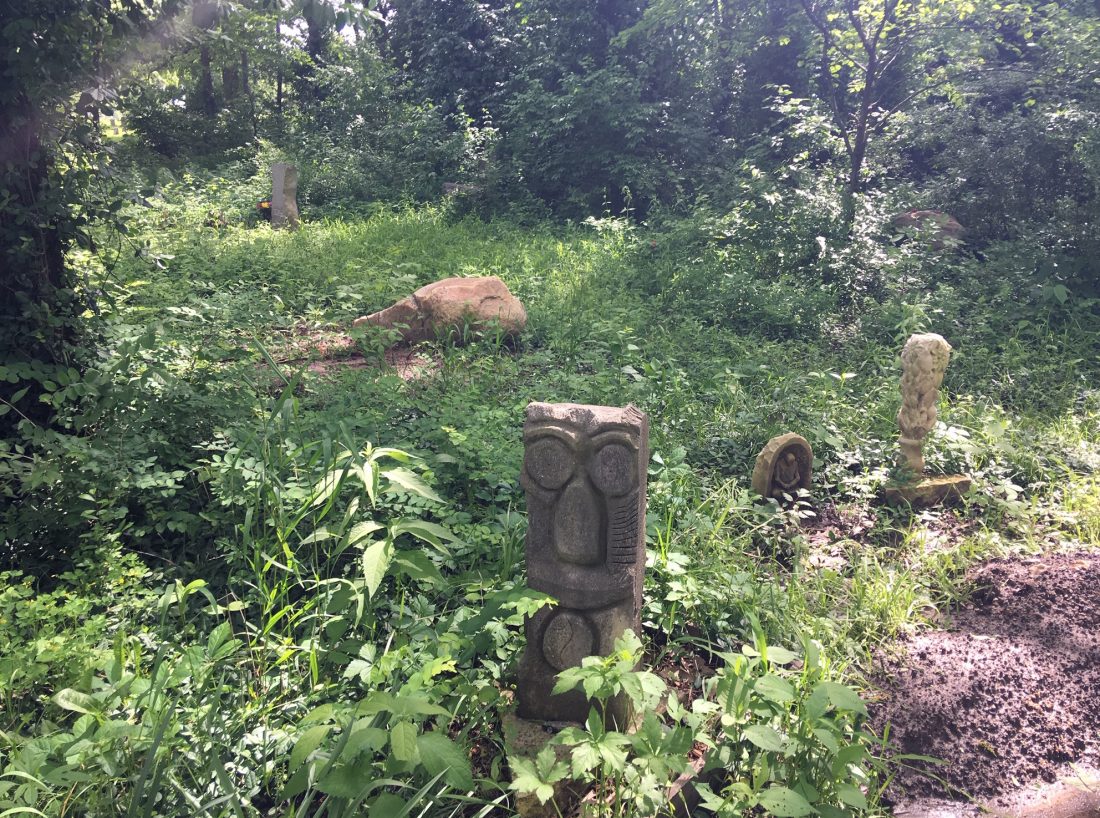Donating body to science and other options for remains should be planned out well

photo by: Kathy Hanks
Audrey Bell, funeral director at Warren-McElwain Mortuary, shows a marker where the cremains from bodies donated to the University of Kansas Medical Center's Willed Body Program are located in Lawrence's Oak Hill Cemetery.
Judy Weide has made her wishes known to her family: She wants to donate her body to science.
She learned about the demand for cadavers from her niece, who was going through medical school and had to share a cadaver for dissection with 20 students. Weide realized that was one way she could someday help.
“If I am finished with my body, then maybe someone else can benefit,” Weide said.
Her son Todd Miller, a funeral director with Rumsey-Yost Funeral Home and Crematory, 601 Indiana St., and she had candid conversations on the subject, Weide said.
What to do with your remains is a topic most people would prefer not to think about when they are busy living. But obviously, choices must be made, and if you don’t make them, someone else will.
It’s important to plan ahead, Miller said, especially if you want to donate your body.
“This must be done when the person is still capable of making decisions,” he said.
Bequeathing to science
On average, 150 to 200 cadavers are accepted each year at the Willed Body Program at the University of Kansas School of Medicine in Kansas City, Kan. The cadavers are used not only by medical students but also by biology and anatomy students at the state’s universities for dissection practice.
“We are the only agency in the state that can accept and distribute human remains for education and research,” said Kay Hawes, associate director of news and media relations at KU Medical Center.
“It’s a privilege to learn on a donated body,” said Hawes, speaking by phone with the Journal-World. “Students really appreciate it.”
Although students can learn with a simulation, Hawes said, so much more can be learned with actual dissection.
“Every student who participates in the cadaver lab is respectful,” Hawes said.
Cadavers are kept for two years. Then they are cremated and either sent back to the family or buried once a year in a shared grave at Lawrence’s Oak Hill Cemetery. A long row of markers is visible with the letters KUMC and the year the cremains were placed in the ground.
Although donating a body to KU is cheaper than some other funeral services, it’s not free. At Rumsey-Yost the cost is $1,475, which includes basic services such as transferring the deceased from the place of death to KU Medical Center.
“It’s a tremendous gift,” Hawes said.
The United Tissue Network is another option for donating a body to science, and that is free, said Audrey Bell, funeral director at Warren-McElwain Mortuary and Cremation Services, 120 W. 13th St. The nonprofit whole-body donation company returns the cremains to the family by mail after the tissue donation.
Doctors and colleges use the bodies for medical training and research, said Jennifer Williams, donor service coordinator in Norman, Okla. Donors are accepted on a case-by-case basis.
Bell estimates that only 10% of the people her mortuary serves in a year choose this type of body donation.
Going green

The natural burial section of Oak Hill Cemetery, established in 2008, is for deceased people who have not been embalmed. Concrete or steel burial vaults are not allowed in this section.
For those who want to leave this world as naturally as possible, one option includes avoiding the embalming process and just being placed in a shroud and directly into the earth in the forested Natural Burial Cemetery next to Oak Lawn Cemetery. Established in 2008 by the Lawrence City Commission, it was the first natural burial cemetery in Kansas. Burials in this section must be done with all biodegradable materials.
“Most people who want a green burial don’t even want a casket. And you don’t have to have one in the green section in Oak Hill Cemetery. When you are going with green you want as natural as possible,” Miller said.
Sometimes people request to be buried on their farm. Although Douglas County does not regulate a private burial plot, it’s important to notify the zoning office, said Tonya Voigt, the county’s interim zoning director.
Voigt strongly recommends filing restrictions on the deed of the property outlining the location and any restrictions the family wishes to place because any future property owners could dig the burial plot up, till or farm over it, or remove any associated headstones or markings.
“It is very important that a restriction is filed on the deed if the family members want the grave site to be intact for years to come,” Voigt said.
Although composting humans is not yet legal in Kansas, Washington on Tuesday became the first state in the nation to pass a law allowing composting as an alternative to burial or cremation. The process turns the body into soil using wood chips and other natural substances.
For those who need a container of some kind, some alternatives to pricey polished caskets exist, such as a casket made out of seaweed or a 100% biodegradable pine box. A man recently called Miller wanting dimensions of caskets because he was building his own. Miller said he thinks that’s wonderful.
“I look at making your service about you,” he said.
Once the time comes for Miller’s mother, and after her body has been used for research, her cremains will be returned to her family. There will be a headstone in the cemetery alongside other family members.
“I want some good to come from my life when I am gone,” Weide said.







COMMENTS